This is the second installment of a 10-part series of articles that describe important events in Thailand over the past 50 years. The first part, published in June, covered 1967-1971.
By Maxmilian Wechsler
1972 was the year when Chulabhorn Dam, named after Princess Chulabhorn Walailak, was opened in Chaiyaphun province. The year also saw the birth of Bangkok Hospital by top medical professionals and the founding of Thai Presidents Foods PCL, makers of the internationally recognized ‘MAMA” noodles brand. Other major news stories included:
January
• Taxi drivers, restaurant and bar owners, food vendors and others relying on revenue from Bangkok nightlife criticized new regulations that came into force imposing a midnight closing hour for entertainment venues, including nightclubs. The National Executive Council also announced restrictions on opening hours for restaurants, cinemas and other entertainment spots. Alcohol sales were banned between 2pm and 5pm.
February
• Britain’s Queen Elizabeth II, Prince Philip and Princess Anne arrived on a six-day visit. They were met by His Majesty King Bhumibol Adulaydej, Queen Sirikit and Princess Sirindhorn at the Chao Phraya River Rajvoradit landing. The visiting royals also met with Prime Minister Thanom Kittikachorn and other government officials, and made excursions to Chulalongkorn University, various Buddhist temples and Christ Church on Convent Road. They also travelled to Chiang Rai to observe and meet with Meo and Hmong hill tribes.
• Thai military assisted by US special forces killed 300 communist insurgents to gain control of the Phu Hin Long Kla area of Loei province. It was the biggest military operation against the insurgents up to that time. Thai First Army Division was dispatched from Bangkok assisted by more than 500 American military advisers and special forces. The operation was conducted in the wake of a rising threat to Thai sovereignty as Vietnamese and Laotian guerrillas had begun assisting and training the Thai insurgents.
January
• Taxi drivers, restaurant and bar owners, food vendors and others relying on revenue from Bangkok nightlife criticized new regulations that came into force imposing a midnight closing hour for entertainment venues, including nightclubs. The National Executive Council also announced restrictions on opening hours for restaurants, cinemas and other entertainment spots. Alcohol sales were banned between 2pm and 5pm.
February
• Britain’s Queen Elizabeth II, Prince Philip and Princess Anne arrived on a six-day visit. They were met by His Majesty King Bhumibol Adulaydej, Queen Sirikit and Princess Sirindhorn at the Chao Phraya River Rajvoradit landing. The visiting royals also met with Prime Minister Thanom Kittikachorn and other government officials, and made excursions to Chulalongkorn University, various Buddhist temples and Christ Church on Convent Road. They also travelled to Chiang Rai to observe and meet with Meo and Hmong hill tribes.
• Thai military assisted by US special forces killed 300 communist insurgents to gain control of the Phu Hin Long Kla area of Loei province. It was the biggest military operation against the insurgents up to that time. Thai First Army Division was dispatched from Bangkok assisted by more than 500 American military advisers and special forces. The operation was conducted in the wake of a rising threat to Thai sovereignty as Vietnamese and Laotian guerrillas had begun assisting and training the Thai insurgents.
March
• President of India Vaharagiri Venkata Giri and his wife Saraswati Bai arrived for an official visit of Thailand during which they met Their Majesties the King and Queen, PM Thanom and other officials.
May
• Takhli air base in Nakhon Sawan province was reopened in order to provide facilities for about 80 US F4 Phantom fighter-bombers there. The base was used by the US for the first time in 1961 and closed in 1970. The government announced that the planes would be used in bombing missions over North Vietnam. The re-opening of the base resulted in an increase of 3,000 US military personnel in
Thailand, bringing the total to 32,000.
June
• Doctors at Ramathibodi hospital in Bangkok performed the first sex change operation in Thailand. The patient, Lek Hokkam, threatened to commit suicide if doctors refused to perform the operation. Doctors proclaimed the operation a success after surgery.
• Hat Yai International Airport was opened, making it possible for international travelers to avoid Bangkok if they wished.
• The founder of Air Siam, Prince Varananda Dhavaj resigned as Chairman and CEO. The Prince founded what was then Varan
Air-Siam on Sep 15, 1965 and was said to be ‘dead broke’ in 1972. The problems arose the year before when Air Siam started a Bangkok-Los Angeles route. The Prince said: “People thought I was competing with the government-owned airline”, referring
to Thai Airways International which later bought Air Siam.
September
• New regulations were adopted to regulate foreign businesses and workers, with more restrictions applied on the type of industries in
which they were allowed involvement.
The government said the new regulations were designed to increase employment opportunities for Thai nationals and reduce foreign
influence over Thai companies. The new regulations stipulated, among other things, that legal and architectural firms had to be Thai majority-owned within two years.
November
• Anti-Japanese sentiment was running high in Thailand, with students leading activities against Japanese interests in the country. The National Student Council and Boy Scouts began pasting posters throughout Bangkok and Chiang Mai demanding a boycott of Japanese products. The National Student Centre accused Japan of using business tricks to cheat Thailand and make it an ‘economic slave’. Police seized machetes and other weapons from Nonthaburi Engineering School students who planned to demonstrate at the Japanese-owned Thai Daimaru department store.
• President of India Vaharagiri Venkata Giri and his wife Saraswati Bai arrived for an official visit of Thailand during which they met Their Majesties the King and Queen, PM Thanom and other officials.
May
• Takhli air base in Nakhon Sawan province was reopened in order to provide facilities for about 80 US F4 Phantom fighter-bombers there. The base was used by the US for the first time in 1961 and closed in 1970. The government announced that the planes would be used in bombing missions over North Vietnam. The re-opening of the base resulted in an increase of 3,000 US military personnel in
Thailand, bringing the total to 32,000.
June
• Doctors at Ramathibodi hospital in Bangkok performed the first sex change operation in Thailand. The patient, Lek Hokkam, threatened to commit suicide if doctors refused to perform the operation. Doctors proclaimed the operation a success after surgery.
• Hat Yai International Airport was opened, making it possible for international travelers to avoid Bangkok if they wished.
• The founder of Air Siam, Prince Varananda Dhavaj resigned as Chairman and CEO. The Prince founded what was then Varan
Air-Siam on Sep 15, 1965 and was said to be ‘dead broke’ in 1972. The problems arose the year before when Air Siam started a Bangkok-Los Angeles route. The Prince said: “People thought I was competing with the government-owned airline”, referring
to Thai Airways International which later bought Air Siam.
September
• New regulations were adopted to regulate foreign businesses and workers, with more restrictions applied on the type of industries in
which they were allowed involvement.
The government said the new regulations were designed to increase employment opportunities for Thai nationals and reduce foreign
influence over Thai companies. The new regulations stipulated, among other things, that legal and architectural firms had to be Thai majority-owned within two years.
November
• Anti-Japanese sentiment was running high in Thailand, with students leading activities against Japanese interests in the country. The National Student Council and Boy Scouts began pasting posters throughout Bangkok and Chiang Mai demanding a boycott of Japanese products. The National Student Centre accused Japan of using business tricks to cheat Thailand and make it an ‘economic slave’. Police seized machetes and other weapons from Nonthaburi Engineering School students who planned to demonstrate at the Japanese-owned Thai Daimaru department store.
|
December
• On December 28 Prince Vajiralongkorn was invested as Crown Prince in a ceremony attended by nobles, diplomats, religious leaders, politicians and military officers at Ananta Smakorn Throne Hall. • Many foreign leaders sent gifts and messages of congratulations. After the formal declaration the King poured lustral water on the Prince as monks chanted. |
• On the same day the investiture was in progress, four Arab gunmen armed with automatic weapons from the Black September terrorist group stormed the Israeli embassy in Bangkok and held six hostages. The terrorists demanded the release of 36 Arab and Palestinian hostages held in Israel and threatened to kill their hostages if their demands were not met. The terrorists set off explosives around the embassy complex, but after tense negotiations they agreed to end the siege. The hostages were released the next morning and the terrorists were allowed to depart for Egypt.
• Dr Chamnah Yuwaboon was appointed first mayor of Greater Bangkok. A few weeks later Bangkok and Thonburi joined under a new administrative structure designated Krungthep Mahanakhon. The title of Bangkok administrative chief has since been changed to governor.
• Dr Chamnah Yuwaboon was appointed first mayor of Greater Bangkok. A few weeks later Bangkok and Thonburi joined under a new administrative structure designated Krungthep Mahanakhon. The title of Bangkok administrative chief has since been changed to governor.
1973 saw the formation of the present Bangkok Metropolitan Administration (BMA). Bangkok Land real estate company was founded and Central Chidlom department store opened its doors for the first time. Also in 1973, Thai film company Five Star Productions was founded and Rajabhat University was established in Kanchanaburi province.
March
• The stockpiling of rice by middlemen looking for bigger profits caused shortages of rice and big price increases. The government responded by purchasing 10% of rice destined for export and selling it at the market price at outlets under its control. The government effort was unsuccessful in pushing down the price of rice, however, and shortages brought hardship to many people, mainly in the North and Northeast.
April
• The 84-kilometre Thonburi-Pak Tho highway was opened linking Thonburi with Samut Prakan and Samut Songkhram provinces. The time needed to reach Hua Hin and points south was cut considerably.
May
• Army commander Praphas Charusathien was promoted to the rank of field marshal. Praphas held simultaneously the positions of deputy supreme commander of the Royal Thai Armed Forces, army commander-in-chief, commander of the Communist Suppression Operations Command, deputy prime minister, interior minister, director-general of the police department, deputy commander of the National Security Council, and president of the Boy Scouts.
June
• A group of Ramkhamhaeng University students organized a protest demanding resignation of the rector for expelling nine students
for publishing a satirical magazine that mocked the government and military officials. Protests spread to other universities and more than 10,000 anti-government demonstrators gathered in Bangkok.
The government agreed to reinstate the nine students, but they remained suspended. More protests followed, culminating in the resignation of the rector.
• According to a survey by the Bangkok Post, “a sharp increase in tourists visiting from West Germany has brought more money to restaurants, hotels, nightclubs and beaches”. The newspaper said the number of German tourists had soared from 4,263 in 1963 to nearly 53,000 in 1972.
• Doctors at Chulalongkorn Hospital successfully performed the country’s first transplant of a kidney provided by a living donor. Somchai Nuaisukul gave one of his healthy kidneys to his brother, Sampan, as both of his kidneys were heavily diseased. Thai surgeons had previously performed kidney transplants but never from a living donor.
March
• The stockpiling of rice by middlemen looking for bigger profits caused shortages of rice and big price increases. The government responded by purchasing 10% of rice destined for export and selling it at the market price at outlets under its control. The government effort was unsuccessful in pushing down the price of rice, however, and shortages brought hardship to many people, mainly in the North and Northeast.
April
• The 84-kilometre Thonburi-Pak Tho highway was opened linking Thonburi with Samut Prakan and Samut Songkhram provinces. The time needed to reach Hua Hin and points south was cut considerably.
May
• Army commander Praphas Charusathien was promoted to the rank of field marshal. Praphas held simultaneously the positions of deputy supreme commander of the Royal Thai Armed Forces, army commander-in-chief, commander of the Communist Suppression Operations Command, deputy prime minister, interior minister, director-general of the police department, deputy commander of the National Security Council, and president of the Boy Scouts.
June
• A group of Ramkhamhaeng University students organized a protest demanding resignation of the rector for expelling nine students
for publishing a satirical magazine that mocked the government and military officials. Protests spread to other universities and more than 10,000 anti-government demonstrators gathered in Bangkok.
The government agreed to reinstate the nine students, but they remained suspended. More protests followed, culminating in the resignation of the rector.
• According to a survey by the Bangkok Post, “a sharp increase in tourists visiting from West Germany has brought more money to restaurants, hotels, nightclubs and beaches”. The newspaper said the number of German tourists had soared from 4,263 in 1963 to nearly 53,000 in 1972.
• Doctors at Chulalongkorn Hospital successfully performed the country’s first transplant of a kidney provided by a living donor. Somchai Nuaisukul gave one of his healthy kidneys to his brother, Sampan, as both of his kidneys were heavily diseased. Thai surgeons had previously performed kidney transplants but never from a living donor.
|
August
• A fire at luxurious Oriental hotel in Bangkok destroyed the lobby and several suites. The fire was apparently caused by a short circuit in an air conditioning unit. The fire caused an estimated five million baht in damage that included art treasures and antiques. Dozens of firefighters battled the blaze for more than two hours. September • The corpse of an alleged communist insurgent was displayed on an open truck throughout the provincial capital of Phatthalung with a sign warning the public that other guerrillas would meet the same fate. The body was that of Chamroen Muangcham, allegedly responsible for the killing of government-backed militia officers. He was shot dead in a battle between 20 guerrillas and a 70-man border patrol unit. |
|
October
• Mass demonstrations erupted after 13 student leaders and activists were arrested for distribution of leaflets calling for the early promulgation of a constitution. When police couldn’t control thousands of demonstrators outside Chitralada Palace the military was called to disperse protesters and began firing into the crowd. Official figures list 77 students killed and 857 injured. The violence continued for several days with buildings on Ratchadamnoen Avenue set on fire. The mass demonstrations led to the collapse of the Thanom regime. He fled to the US with family members. His son, Colonel Narong Kittikachorn, and father-in-law General Praphas Charusathien escaped to Taiwan with their families. Siam Center was opened with a great pomp. Buddhist monks blessed the opening ceremony with the Princess Mother and other distinguished guests in attendance. It was the biggest indoor shopping centre in Thailand at the time. |
|
November
• Thousands of workers went on strike throughout the country demanding better pay, walking out of hospitals, banks, government offices, factories and other enterprises. The government lead by Prime Minister Sanya Dharmasakti said it was considering an increase in the minimum wage, which was set at 16 baht a day. December • PM Sanya was given emergency powers as Thailand faced crisis after oil- producing Gulf states announced a doubling of price of oil. The decree empowered the PM to regulate the production, sale, transportation, possession and importation of all types of fuel. In an attempt to save energy, business hours and services were reduced in Bangkok, street lights were dimmed and a curfew was imposed on petrol station opening hours. The new regulations caused protests from nighttime entertainment venues. |
1974 was the year when Sirikit Dam, named after Queen Sirikit, was opened and the Social Action Party was founded. It also saw the birth of Payap University, a private institution in Chiang Mai founded by the Church of Christ.
|
January
• Around 5,000 people demonstrated outside the US embassy on Wireless Road demanding the recall of Ambassador William Kintner and a halt to all CIA operations in Thailand. The demonstration followed the revelation that a letter to the Thai government reportedly written by two communist insurgent leaders proposing a ceasefire had been forged by the CIA. • Japanese Prime Minister Kakuei Tanaka received a very low-key welcome from Thai PM Sanya and other Thai officials when he arrived at Don Muang airport. Thousands of students waited outside the Erawan Hotel where he was lodged and shouted at his car. The protest stemmed from charges that Japan was economically exploiting Thailand. |
June
• The month of June saw the last flight of Air America, a passenger and cargo airline run by the CIA which was used for covert operations and missions in Laos and North Vietnam. Air America announced that it was ceasing operations in Thailand and that it would give over four billion baht worth of equipment to Thai Airways International. Air America had about 250 employees and was based in Udon Thani.
• The government conceded to demands by thousands of textile workers all over Thailand and to increase the daily minimum wage to 20 baht. Strikers threatened violence after student leaders riled them up at Sanam Luang, where around 20,000 textile workers gathered.
• The month of June saw the last flight of Air America, a passenger and cargo airline run by the CIA which was used for covert operations and missions in Laos and North Vietnam. Air America announced that it was ceasing operations in Thailand and that it would give over four billion baht worth of equipment to Thai Airways International. Air America had about 250 employees and was based in Udon Thani.
• The government conceded to demands by thousands of textile workers all over Thailand and to increase the daily minimum wage to 20 baht. Strikers threatened violence after student leaders riled them up at Sanam Luang, where around 20,000 textile workers gathered.
|
July
• Tension between police and Thai-Chinese outside Plabplachai police station in Chinatown triggered three days of confrontation. Tanks guarded various ministries as security forces clashed with the rioters, some allegedly belonging to the Eagles and Dragon gangs. PM Sanya declared a state of emergency. Snipers fired from windows in Chinatown, bombs were thrown and vehicles commandeered. The clashes resulted in 33 deaths and 123 injuries. • The National Assembly voted to seize the assets of the ‘Three Tyrants’ – Thanom, Praphas and Narong. The value of the seized assets was estimated to be between 700 million and 1.4 billion baht. |
October
• The Ministry of the Interior announced that hill tribe people were not entitled to Thai citizenship amid complaints that around a half million of them living in 15 northern Thai provinces lacked access to education, health services and other rights.
Around 100,000 people gathered at Sanam Luang where the King and Queen lit funeral pyres of those who died in the 1973 October uprising that led to the removal of Thanom. PM Sanya eulogized the fallen as Buddhist monks chanted in the background.
November
• Farmers from all over the country arrived in Bangkok to join a protest over the failure of the government to solve land ownership problems. The farmers were joined by student leaders as about 20,000 people demonstrated outside Government House. They called PM Sanya a tyrant and cabinet members ‘cheaters and liars’.
• Thousands of prisoners rioted simultaneously at Bang Kwang and Lard Yao prisons after learning that the government has decided not to issue any amnesties that year. About 35 prisoners were injured when prison guards opened fire with machine guns.
December
• About 400 monks staged a protest at Sanam Luang against an order by the Ecclesiastical Council that banned them from participating in any political acts.
• The Ministry of the Interior announced that hill tribe people were not entitled to Thai citizenship amid complaints that around a half million of them living in 15 northern Thai provinces lacked access to education, health services and other rights.
Around 100,000 people gathered at Sanam Luang where the King and Queen lit funeral pyres of those who died in the 1973 October uprising that led to the removal of Thanom. PM Sanya eulogized the fallen as Buddhist monks chanted in the background.
November
• Farmers from all over the country arrived in Bangkok to join a protest over the failure of the government to solve land ownership problems. The farmers were joined by student leaders as about 20,000 people demonstrated outside Government House. They called PM Sanya a tyrant and cabinet members ‘cheaters and liars’.
• Thousands of prisoners rioted simultaneously at Bang Kwang and Lard Yao prisons after learning that the government has decided not to issue any amnesties that year. About 35 prisoners were injured when prison guards opened fire with machine guns.
December
• About 400 monks staged a protest at Sanam Luang against an order by the Ecclesiastical Council that banned them from participating in any political acts.
1975 saw the formation of the Stock Exchange of Thailand and the Taipei Economic and Cultural Office. The Human Development Foundation, also referred as Mercy Centre, was established and the Nong Khai refugee camp was built to accommodate the influx of Laotian refugees following the fall of Laos to communist insurgents.
January
• More than 1,000 students were sent home after 57 teachers at five primary schools in Yala province in southern Thailand quit, fearing they could be the target of kidnapping and other violence by Islamic separatists. The teachers said they would not return until better security was provided.
• In the general election the Democrat Party won 72 seats in the 269 seat House of Representatives. Social Justice Party was second, winning 45 seats, and the Thai National Party came in third with 28 seats. More than 40 parties contested the election.
February
• An earthquake centred under the Andaman Sea and measuring 6.0 on the Richter scale rocked Bangkok and nine other provinces. Thousands of panicked workers ran out of Bangkok office towers but no deaths, injuries or damage were reported.
• In a demonstration organized by the National Students Centre of Thailand 8,000 people gathered in Sanam Luang to protest alleged human right violations by the Internal Security Operation Command (ISOC) in villages in Phattalung province. ISOC was assigned to suppress the communist insurgency. Student activists who travelled to Phattalung said they had evidence that 868 villagers had been killed in suppression activities in 1971-1972. Three days after the protest supervision of ISOC was transferred from the Army to the Interior Ministry.
January
• More than 1,000 students were sent home after 57 teachers at five primary schools in Yala province in southern Thailand quit, fearing they could be the target of kidnapping and other violence by Islamic separatists. The teachers said they would not return until better security was provided.
• In the general election the Democrat Party won 72 seats in the 269 seat House of Representatives. Social Justice Party was second, winning 45 seats, and the Thai National Party came in third with 28 seats. More than 40 parties contested the election.
February
• An earthquake centred under the Andaman Sea and measuring 6.0 on the Richter scale rocked Bangkok and nine other provinces. Thousands of panicked workers ran out of Bangkok office towers but no deaths, injuries or damage were reported.
• In a demonstration organized by the National Students Centre of Thailand 8,000 people gathered in Sanam Luang to protest alleged human right violations by the Internal Security Operation Command (ISOC) in villages in Phattalung province. ISOC was assigned to suppress the communist insurgency. Student activists who travelled to Phattalung said they had evidence that 868 villagers had been killed in suppression activities in 1971-1972. Three days after the protest supervision of ISOC was transferred from the Army to the Interior Ministry.
May
• More than 10,000 people marched on the US embassy to protest theunauthorized use of U-tapao air base by the US military in an operation to free the Mayaguez merchant ship seized by Khmer Rouge guerrillas. The students held up placards and shouted anti-American slogans. The Thai government demanded an apology from the US for flying over 1,000 Marines to U-tapao base without permission. The US later issued an apology for violating Thai sovereignty.
• A bill allowing people to carry guns without a permit was passed overwhelmingly by Parliament in response to an alarming increase in crime.
• More than 10,000 people marched on the US embassy to protest theunauthorized use of U-tapao air base by the US military in an operation to free the Mayaguez merchant ship seized by Khmer Rouge guerrillas. The students held up placards and shouted anti-American slogans. The Thai government demanded an apology from the US for flying over 1,000 Marines to U-tapao base without permission. The US later issued an apology for violating Thai sovereignty.
• A bill allowing people to carry guns without a permit was passed overwhelmingly by Parliament in response to an alarming increase in crime.
|
August
• The home of Prime Minister Kukrit Pramoj was ransacked by a mob of hundreds of people led by pistol-waving policemen. Police were angry at Kukrit because they thought the government was too lenient with leftists. The PM wasn’t at home during the attack. • Hundreds of right-wing vigilantes went on a rampage at Thammasat University, shooting handguns, throwing bombs, burning buildings, and intimidating students involved in political activities. Luckily most students had already been sent home as university administrators were tipped off that the vigilantes were coming. |
• The Phra Trat Phanom chedi collapsed after a freak storm. The chedi near the Thai-Lao border in Nakhon Phanom province was the oldest in Thailand. Some worshippers took this event as a bad omen and predicted war would break out between Laos and Thailand.
October
• Ampa Patharavanik became the first woman in Thailand to be promoted to the rank of ambassador. She later became ambassador to Sri Lanka.
November
• Seven months after the Khmer Rouge took over Cambodia, Thailand renewed diplomatic relations with Cambodia during a five-day visit to Bangkok by Cambodian Deputy Prime Minister Ieng Sary.
• An anti-Vietnamese mob went on a rampage in Nong Khai province a few days after communist Pathet Lao forces attacked Thai gunboats on the Mekong River. The mob attacked about 150 Vietnamese-run shops and homes. The Vietnamese were seen as communist sympathizers by the mob.
December
• Around 10,000 protesters marched through Pattani town to demand justice in the alleged killing of 18 Muslims by the military. Soldiers were put on alert and the National Security Council considered ordering a state of emergency.
• The Bangkok Metropolitan Administration decided to stop battling against street vendors and actually embraced them as a part of the city’s culture. Bangkok Deputy Governor Opas Thammavanij declared: “We can’t stop hawkers from selling things on the roadsides, nor can we live without them.”
• Ampa Patharavanik became the first woman in Thailand to be promoted to the rank of ambassador. She later became ambassador to Sri Lanka.
November
• Seven months after the Khmer Rouge took over Cambodia, Thailand renewed diplomatic relations with Cambodia during a five-day visit to Bangkok by Cambodian Deputy Prime Minister Ieng Sary.
• An anti-Vietnamese mob went on a rampage in Nong Khai province a few days after communist Pathet Lao forces attacked Thai gunboats on the Mekong River. The mob attacked about 150 Vietnamese-run shops and homes. The Vietnamese were seen as communist sympathizers by the mob.
December
• Around 10,000 protesters marched through Pattani town to demand justice in the alleged killing of 18 Muslims by the military. Soldiers were put on alert and the National Security Council considered ordering a state of emergency.
• The Bangkok Metropolitan Administration decided to stop battling against street vendors and actually embraced them as a part of the city’s culture. Bangkok Deputy Governor Opas Thammavanij declared: “We can’t stop hawkers from selling things on the roadsides, nor can we live without them.”
|
1976 was the year when Pattaya became the second independent administrative area in Thailand (after Bangkok); Bangkok Mass Transit Authority began operations; Phayathai Hospital and RS PLC entertainment company were founded.
January • A five-hour fire burned down almost half of the Patpong entertainment district in the centre of Bangkok. March • A hand grenade thrown into a crowd of about 5,000 anti-American protesters who gathered in Siam Square killed four students and injured 82 others. The protesters then went to the US embassy where student leader Thirayuth Boonmee accused the extreme right-wing paramilitary organization known as the Red Gaurs of throwing the grenade on orders from the CIA. April • A general election was held after the House of Representative was dissolved prematurely. The Democrat Party won 114 of 279 seats in the House, followed by Thai National Party with 56 seats and Social Action Party with 45 seats. Voter turnout was only 44% as 39 parties contested the election. |
June
• The King and Queen honored about 8,000 Village Scouts representing units from all over Thailand at a rally held in Lumpini Park.
• American troops left U-tapao air base and Ramasun Station, ending US involvement in a decade-long war in Southeast Asia.
August
• About 200 right-wing Red Gaurs and vocational students attempted to storm Thammasat University, where more than 5,000 students from Thammasat and Ramkhamhaeng universities were protesting the return of former strongman Praphas. Student guards tried block the intruders from entering the campus. While they tried to scale the campus fence machine gun fire erupted and a hand grenade exploded. Two people were killed and about 60 injured. Praphas had returned to Thailand from exile in Taiwan against the wishes of Prime Minister Seni Pramoj. Praphas told members of the government that he would stay and fight the charges against him.
• The Parliamentary budgetary committee threatened to block passage of the 770 million baht allocated to the ISOC unless there was more transparency about what the money was to be used for. The committee questioned the necessity of ISOC involvement in containing the communist insurgency in light of recent positive developments between Thailand and neighbouring communist countries. ISOC coordinator General Saiyud Kerdphol said the money was necessary for salaries, intelligence gathering and propaganda.
• The King and Queen honored about 8,000 Village Scouts representing units from all over Thailand at a rally held in Lumpini Park.
• American troops left U-tapao air base and Ramasun Station, ending US involvement in a decade-long war in Southeast Asia.
August
• About 200 right-wing Red Gaurs and vocational students attempted to storm Thammasat University, where more than 5,000 students from Thammasat and Ramkhamhaeng universities were protesting the return of former strongman Praphas. Student guards tried block the intruders from entering the campus. While they tried to scale the campus fence machine gun fire erupted and a hand grenade exploded. Two people were killed and about 60 injured. Praphas had returned to Thailand from exile in Taiwan against the wishes of Prime Minister Seni Pramoj. Praphas told members of the government that he would stay and fight the charges against him.
• The Parliamentary budgetary committee threatened to block passage of the 770 million baht allocated to the ISOC unless there was more transparency about what the money was to be used for. The committee questioned the necessity of ISOC involvement in containing the communist insurgency in light of recent positive developments between Thailand and neighbouring communist countries. ISOC coordinator General Saiyud Kerdphol said the money was necessary for salaries, intelligence gathering and propaganda.
September
• Thanom returned arrived at Don Muang airport from Singapore, and wearing a novice monk’s robe immediately entered the monkhood at Wat Bowonniwet in Bangkok’s Phra Nakhon district. PM Seni said there was nothing the government could do about Thanom’s return, and he resigned his post a few days later.
October
• Just before dawn on October 6, mobs of Red Gaurs and other rightwing extremists along with police and military units gathered outside Thammasat University and began shooting at students who were gathered inside to protest the arrival of Thanom. Some students reportedly returned the fire. The right-wingers, police and military personnel entered the campus and began beating students. According to government figures 46 students were killed, 167 injured and 3,000 arrested. Some claim the death toll was much higher. At 6pm the state-run media announced the successful completion of a coup and the formation of a military council.
• Supreme Court Judge Thanin Kraivixien was appointed prime minister on October 8, but the real power lay with the National Administrative Reform Council, the group of military officers who staged the coup.
• Thanom returned arrived at Don Muang airport from Singapore, and wearing a novice monk’s robe immediately entered the monkhood at Wat Bowonniwet in Bangkok’s Phra Nakhon district. PM Seni said there was nothing the government could do about Thanom’s return, and he resigned his post a few days later.
October
• Just before dawn on October 6, mobs of Red Gaurs and other rightwing extremists along with police and military units gathered outside Thammasat University and began shooting at students who were gathered inside to protest the arrival of Thanom. Some students reportedly returned the fire. The right-wingers, police and military personnel entered the campus and began beating students. According to government figures 46 students were killed, 167 injured and 3,000 arrested. Some claim the death toll was much higher. At 6pm the state-run media announced the successful completion of a coup and the formation of a military council.
• Supreme Court Judge Thanin Kraivixien was appointed prime minister on October 8, but the real power lay with the National Administrative Reform Council, the group of military officers who staged the coup.
|
December
• EgyptAir flight 863 from Cairo crashed on approach to Don Muang airport killing all 52 aboard. The Boeing 707 hit an industrial complex and also killed 19 nightshift workers. The Public Prosecutor Department dropped charges against former military strongmen for suppressing the 1973 democracy uprising. The prosecutors said that there was no evidence against Thanom, Praphas and Narong. • Heavily armed communist insurgents ambushed a Thai military convoy on a road near the Lao border in Nan province, killing 22 of 26 Thai soldiers. The communists fired rocket-propelled grenades and machine guns at the convoy. It was the biggest loss of life on the Thai government side in the 12-year-old conflict. The Army said the insurgents also suffered heavy losses. *Sources for this story include archives of UPI, AFP, the Bangkok Post, The Nation and Wikipedia. |

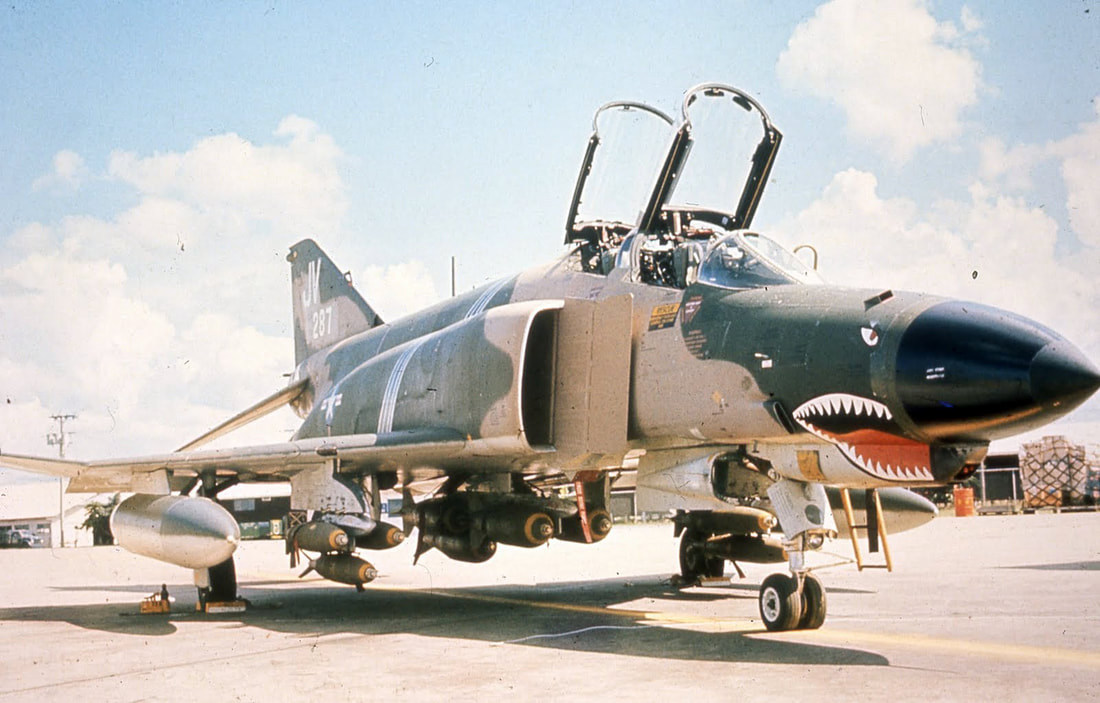
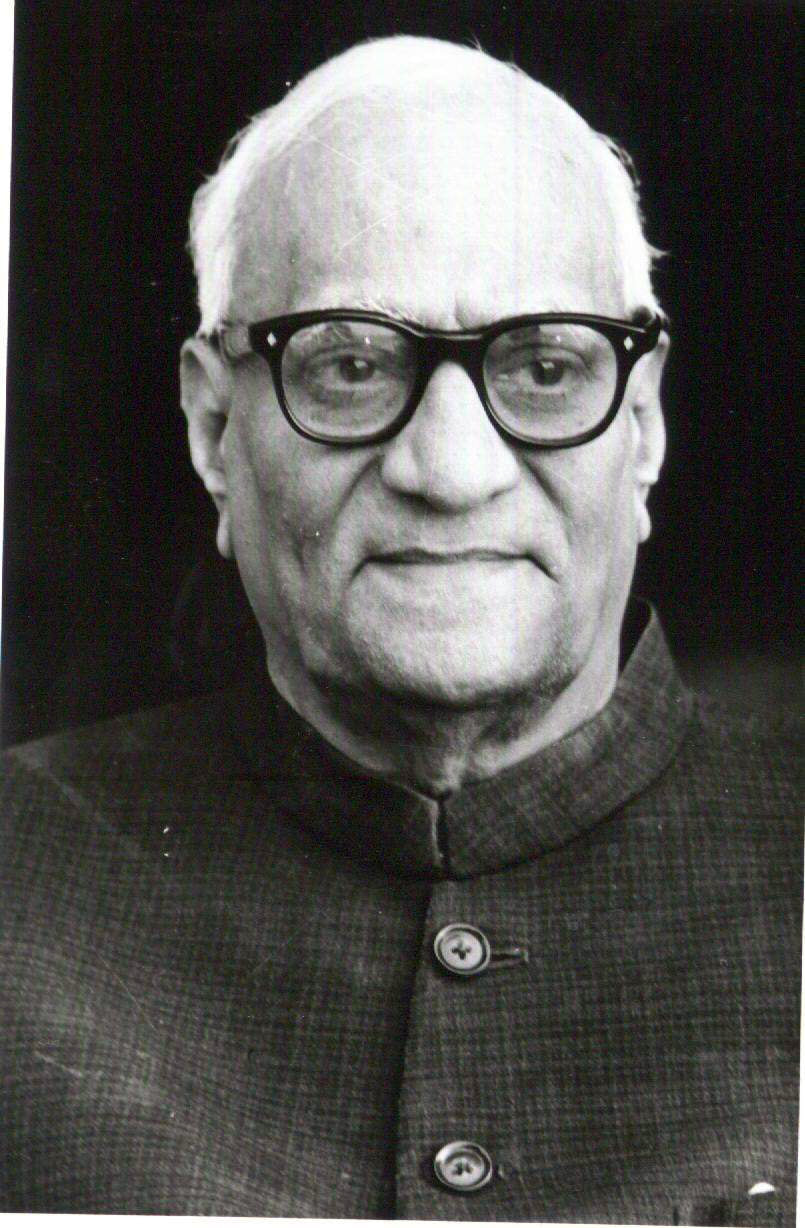
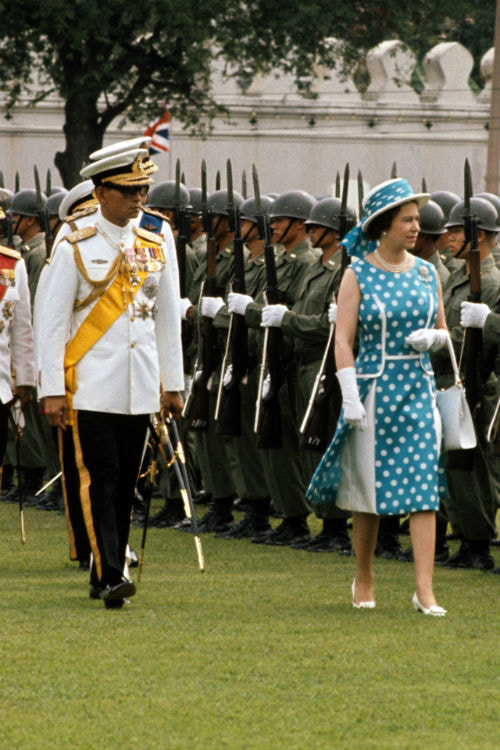
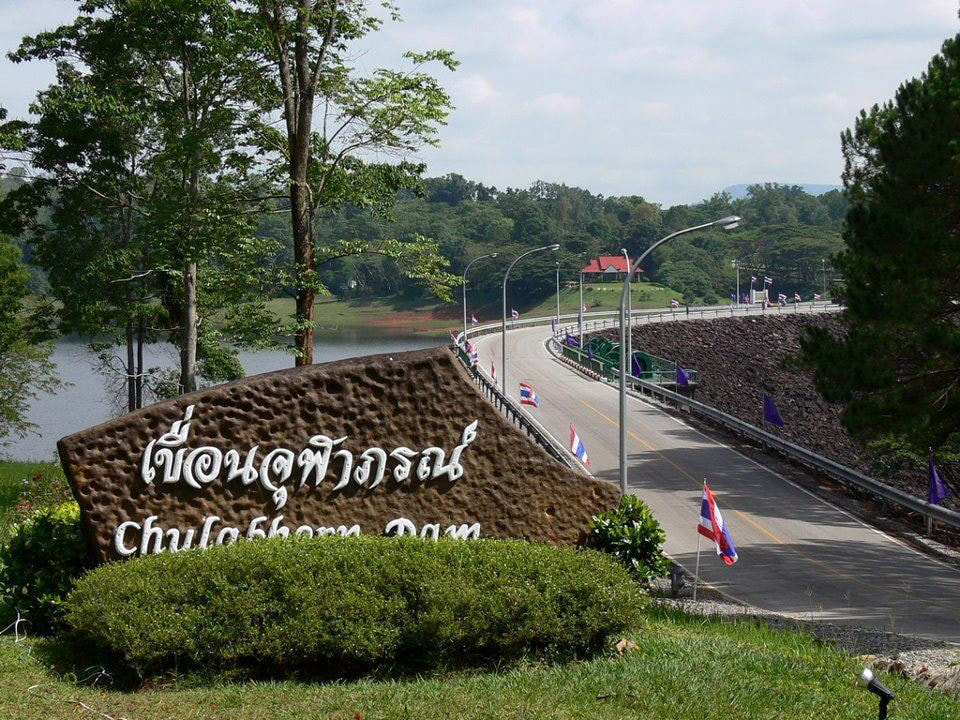
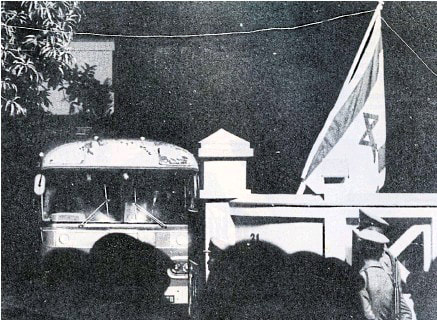
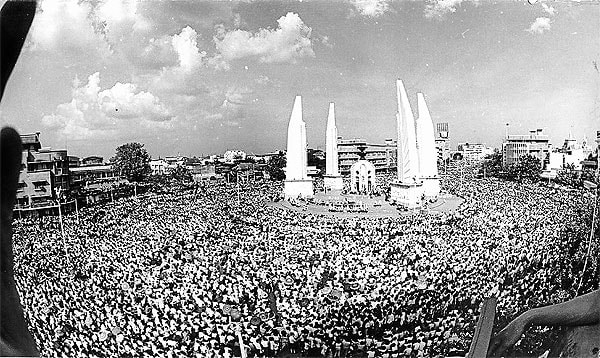
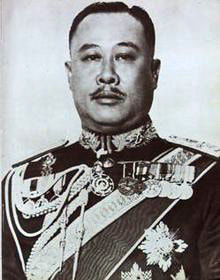
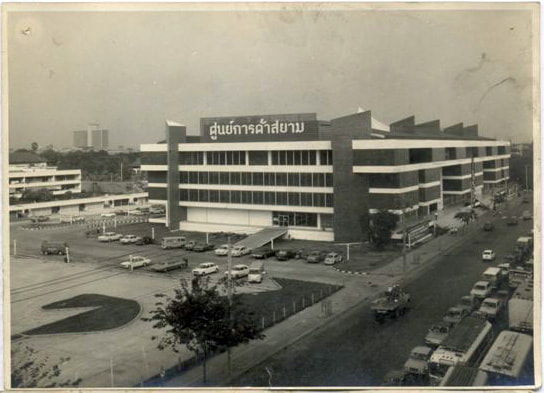
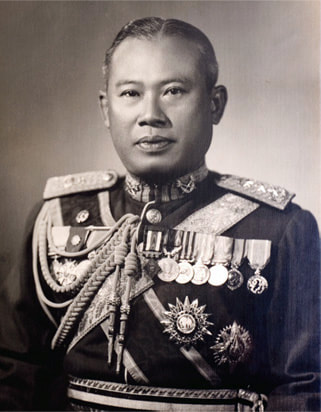
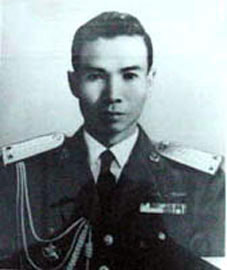
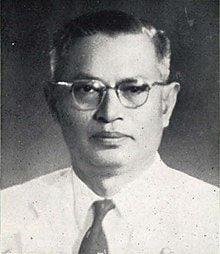
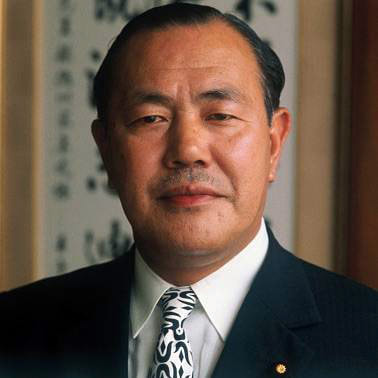
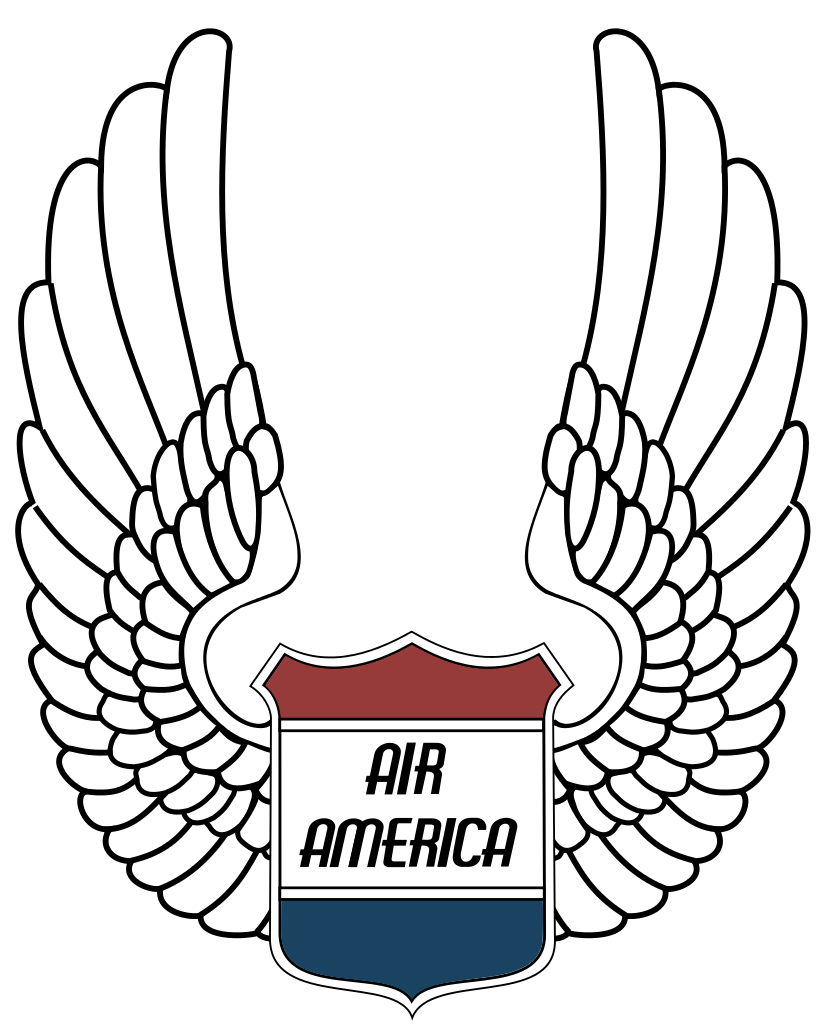
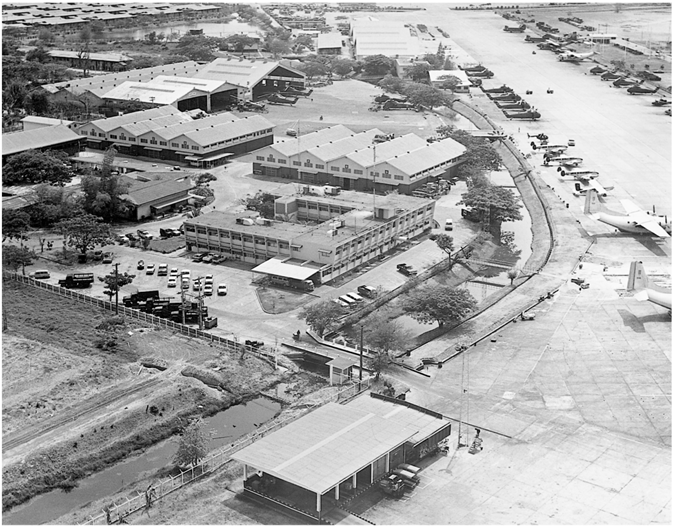
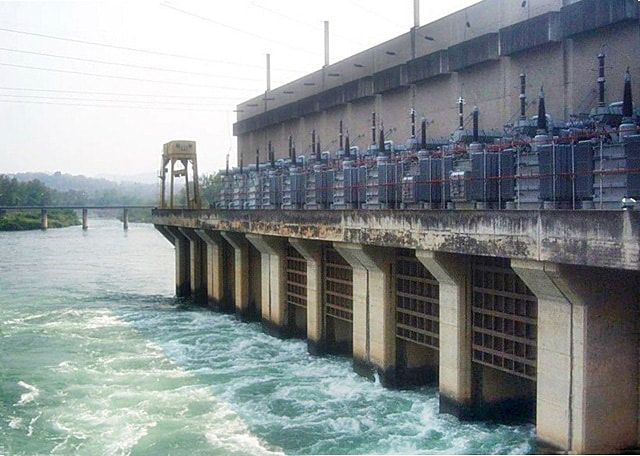
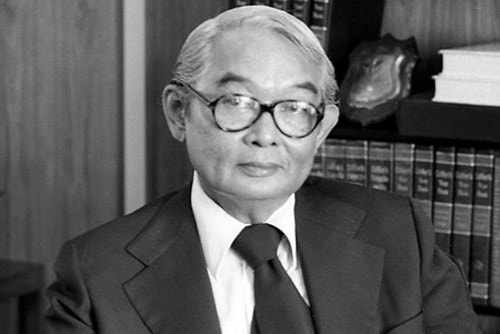
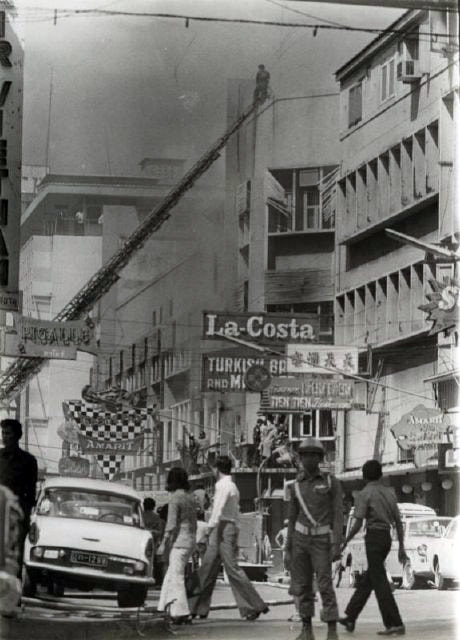
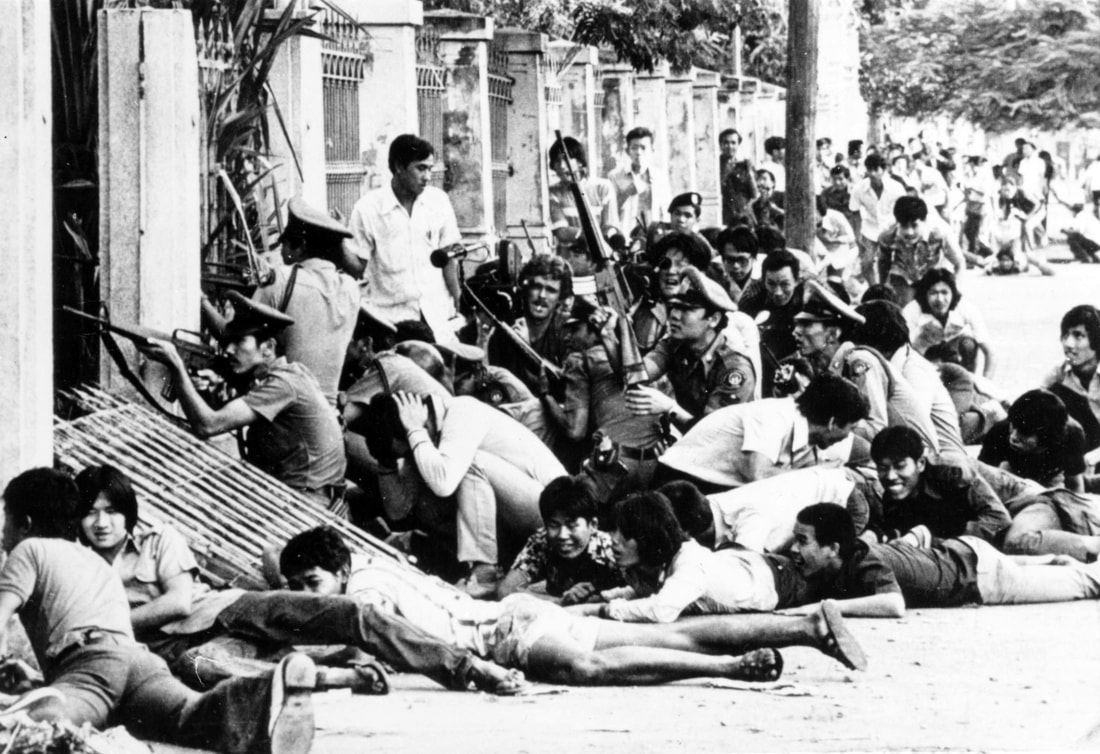
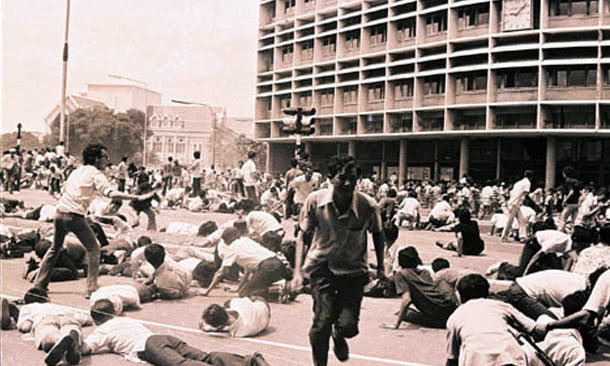
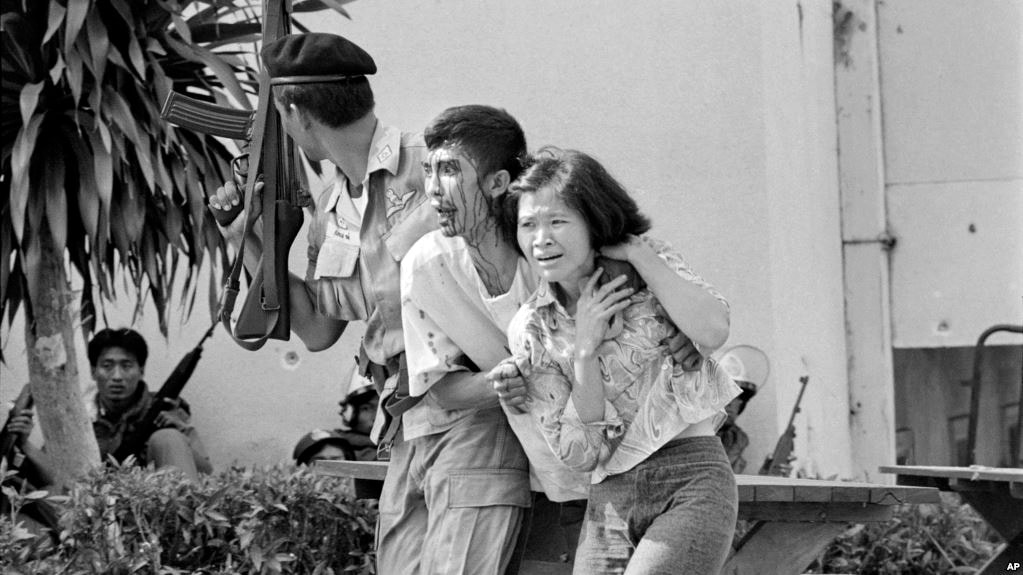
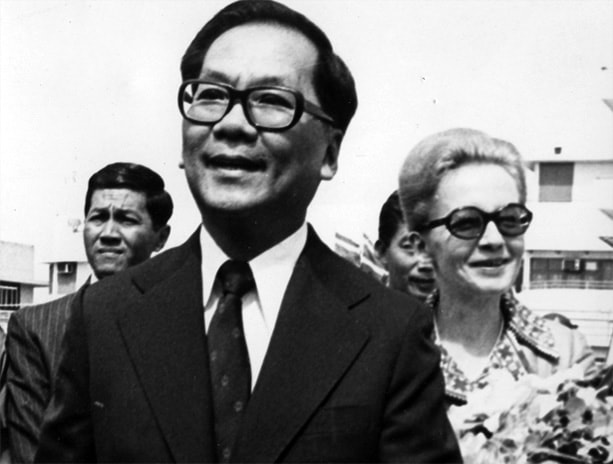
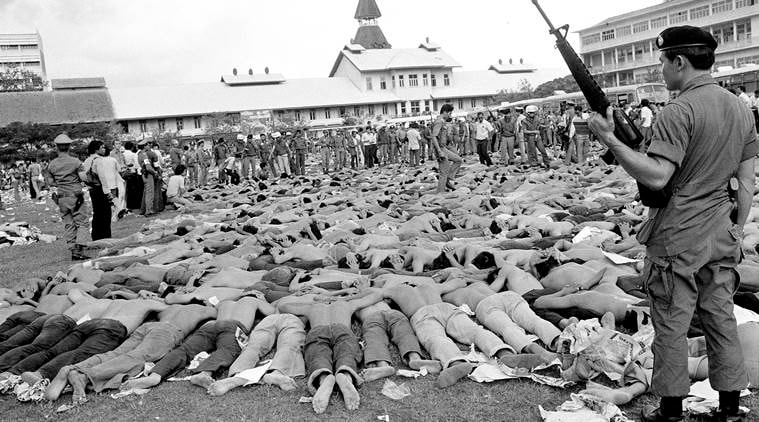
 RSS Feed
RSS Feed
















